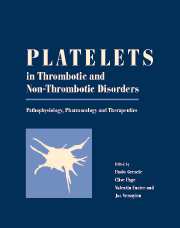Book contents
- Frontmatter
- Contents
- List of contributors
- Editors' preface
- PART I PHYSIOLOGY
- PART II METHODOLOGY
- PART III PATHOLOGY
- PART IV PHARMOLOGY
- 61 Aspirin
- 62 Pharmacology of ticlopidine and clopidogrel
- 63 Platelet membrane glycoprotein (GP) IIb–IIIa antagonists and acute arterial thrombosis
- 64 Other antiplatelet agents
- 65 Pharmacogenetics as a new antiplatelet strategy
- 66 Cardiovascular gene therapy: implications for platelet vessel wall interactions
- 67 Pharmacological modulation of the inflammatory actions of platelets
- PART V THERAPY
- Afterword: Platelets: a personal story
- Index
- Plate section
64 - Other antiplatelet agents
from PART IV - PHARMOLOGY
Published online by Cambridge University Press: 10 May 2010
- Frontmatter
- Contents
- List of contributors
- Editors' preface
- PART I PHYSIOLOGY
- PART II METHODOLOGY
- PART III PATHOLOGY
- PART IV PHARMOLOGY
- 61 Aspirin
- 62 Pharmacology of ticlopidine and clopidogrel
- 63 Platelet membrane glycoprotein (GP) IIb–IIIa antagonists and acute arterial thrombosis
- 64 Other antiplatelet agents
- 65 Pharmacogenetics as a new antiplatelet strategy
- 66 Cardiovascular gene therapy: implications for platelet vessel wall interactions
- 67 Pharmacological modulation of the inflammatory actions of platelets
- PART V THERAPY
- Afterword: Platelets: a personal story
- Index
- Plate section
Summary
Reversible COX-1 inhibitors
While aspirin induces irreversible acetylation of the cyclooxygenase moiety of the PGG/H synthase enzyme, other non-steroidal anti-inflammatory drugs (NSAIDs) bind reversibly at, or close to, the active site.
Several NSAIDs have been tested as inhibitors of platelet function. Their effects are reversible within several hours, necessitating multiple daily doses to produce important inhibition of thromboxane A2. The use of NSAID is also limited by the high rate of gastrointestinal side effects. During naproxen therapy, 400 mg twice a day, increasing the bleeding time, the rate of endoscopically determined gastroduodenal ulcers was 26%, significantly greater than with placebo. The prevalence of gastroduodenal ulcers is from 15% to 30% among users of other NSAIDs.
Sulfinpyrazone is one of the most studied platelet COX inhibitors. The inhibitory effects of sulfinpyrazone on platelets are more marked ex vivo than in vitro. This behaviour is shared with other antiplatelet drugs including ticlopidine and is dependent on active metabolites formed in vivo. The thioether metabolite of sulfinpyrazone is between 8 and 13 times more potent than the parent compound as an inhibitor of platelet aggregation induced by arachidonic acid. Platelet inhibition is transient with sulfinpyrazone and, after several daily regimens of 200 mg four times a day, inhibition of platelet aggregation no longer is evident 24 hours after the final dose.
- Type
- Chapter
- Information
- Platelets in Thrombotic and Non-Thrombotic DisordersPathophysiology, Pharmacology and Therapeutics, pp. 955 - 963Publisher: Cambridge University PressPrint publication year: 2002



